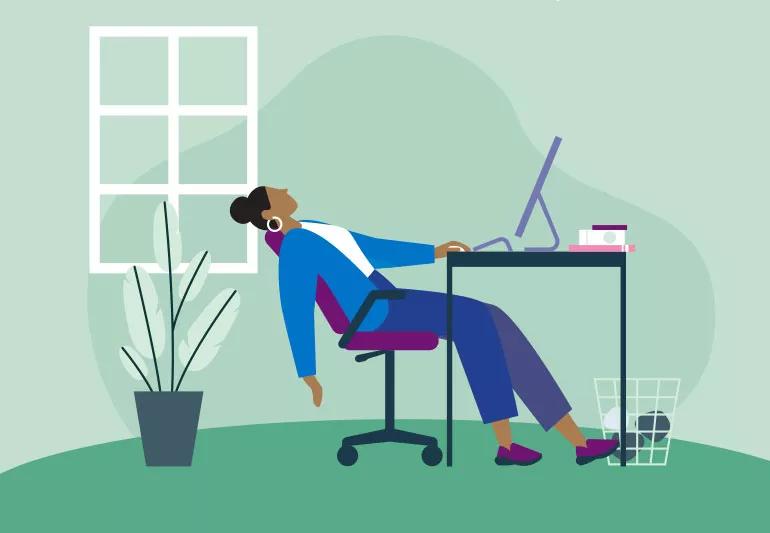If you’re worn down and sluggish, it can be more than just feeling exhausted

Feeling run down after what you thought was a good night’s sleep? Reaching for that third cup of coffee by noon to keep you going? Sure, we all feel tired at different points in our lives.
Advertisement
Cleveland Clinic is a non-profit academic medical center. Advertising on our site helps support our mission. We do not endorse non-Cleveland Clinic products or services. Policy
But if you’re always feeling tired, it can be more than just not getting enough sleep. Feeling tired can stem from more serious issues like sleep apnea, depression, diabetes or chronic kidney disease.
Family medicine specialist Jared Ankerman, MD, discusses the different reasons you might be feeling so tired.
Are being tired and feeling fatigued the same thing? Yes and no, says Dr. Ankerman.
“In today’s day and age, we use those terms interchangeably, which isn’t correct,” he says. “Tiredness is something that is natural. You might be tired after a busy day at work or exercising. That’s normal and most people experience that.”
On the other hand, fatigue is more intense than just being tired.
“No matter how much you rest, or how little you do, you still have this feeling of not having a ton of energy or ability to do much,” says Dr. Ankerman. “It can sometimes be a sign of something more serious going on.”
So what might be causing you to be tired or feel fatigued? Here are a few reasons.
If you have an iron deficiency, known as anemia, you don’t produce enough red blood cells. Those cells are needed to supply your body with the right amount of oxygen for organs to function correctly. It can lead you to feel run down and exhausted.
Advertisement
Anemia is the most common blood condition in the U.S., affecting an estimated 3 million Americans.
Are you waking up throughout the night? You may have sleep apnea, a sleep disorder where your breathing is interrupted during sleep.
While sleep apnea can lead to other health problems like high blood pressure, diabetes and heart attacks, it can also cause you to feel more tired than usual.
“Inadequate sleep or broken irregular sleep can contribute to fatigue or tiredness,” says Dr. Ankerman. “A lot of people are chronically sleep deficient. I recommend that adults try to get at least eight hours of sleep.”
It makes sense that if you’re pregnant you might be more tired than usual.
“It’s a strain on your body,” says Dr. Ankerman. “You’re growing another human inside your body. Your body’s working to support you and the fetus with blood flow and energy.”
Especially in your first trimester, you produce more progesterone, a hormone that can cause you to feel tired.
For people who have diabetes, feeling tired is one of the main symptoms.
“If people are poorly controlling their diabetes, they will see a spike in their blood sugar levels,” says Dr. Ankerman. “Having those spikes can actually dehydrate you slightly and that can cause fatigue.”
Talking to your doctor about how you’re tired is a good starting point on determining if there are any underlying causes, says Dr. Ankerman. Your doctor will start with your medical history, do a physical exam and possibly request bloodwork.
“If that’s all normal and we can’t find any cause of fatigue or tiredness, we’ll start to look at mood disorders,” says Dr. Ankerman.
Depression can cause you to have little interest in daily activities, which can lead to fatigue, as well as affect your eating and sleeping habits.
Hypothyroidism, a condition where the thyroid gland (a small, butterfly-shaped organ located near the front of your neck) doesn’t produce enough thyroid hormone. Your metabolism starts to slow down and that can lead to fatigue.
“When you talk to your doctor they will likely order some tests on your thyroid to determine if you have thyroid issues,” says Dr. Ankerman.
A decrease in kidney function may lead to a collection of toxins and impurities in the blood, which can cause you to feel tired and weak. Another risk factor? You can develop anemia, which can also explain your tiredness.
“Especially patients who have end-stage renal disease or those who are on dialysis, they can have issues with fatigue,” says Dr. Ankerman.
Advertisement
You have a cold or the flu. You’re feeling worn down and tired. That’s because your body is fighting the infection and it’s putting a strain on your immune system.
“More serious bacterial and viral infections can interact with different organ systems which can cause fatigue,” says Dr. Ankerman.
Infections like mononucleosis and COVID-19 can even cause long-lasting tiredness.
Not getting enough vitamin B12 or vitamin D? That can cause you to feel tired as well.
“I normally look for certain nutritional deficiencies,” says Dr. Ankerman. “Having a vitamin deficiency can cause issues with fatigue.”
If your doctor finds you have a vitamin deficiency, they may suggest dietary changes or using supplements.
If you have persistent, crippling fatigue that lasts 6 months or longer, you may have chronic fatigue syndrome.
“Chronic fatigue syndrome has been studied more in the past five to 10 years,” says Dr. Ankerman. “Before it was thought of to be more of a psychiatric diagnosis.”
Those with chronic fatigue syndrome may experience symptoms like:
“It can be debilitating,” says Dr. Ankerman.
Advertisement
While there is no cure for chronic fatigue syndrome, it can be managed with cognitive behavioral therapy and medication like sleep aids.
“It’s so important to talk to your doctor if you’re having symptoms,” says Dr. Ankerman. “If you’re concerned that this could be something more than just run-of-the-mill tiredness, they can help.”
Advertisement

Sign up for our Health Essentials emails for expert guidance on nutrition, fitness, sleep, skin care and more.
Learn more about our editorial process.
Advertisement

Drink some water, take a little walk, step away from your computer and chat with a coworker, or even your toddler, to help ward off daytime sleepiness

What’s on your plate can either help power you through your day or put you in nap mode

Eating turkey is only a small part of the reason you want to take a nap

Carve out time for yourself — and cut down the number of decisions you make each day

Sleepiness and lack of energy aren’t the same thing

Practical solutions for fighting flagging energy

Don’t be misled by bogus answer to fatigue

A Q&A to help you fight exhaustion and get more sleep

Even small moments of time outdoors can help reduce stress, boost mood and restore a sense of calm

A correct prescription helps your eyes see clearly — but as natural changes occur, you may need stronger or different eyeglasses

Both are medical emergencies, but they are very distinct events with different causes